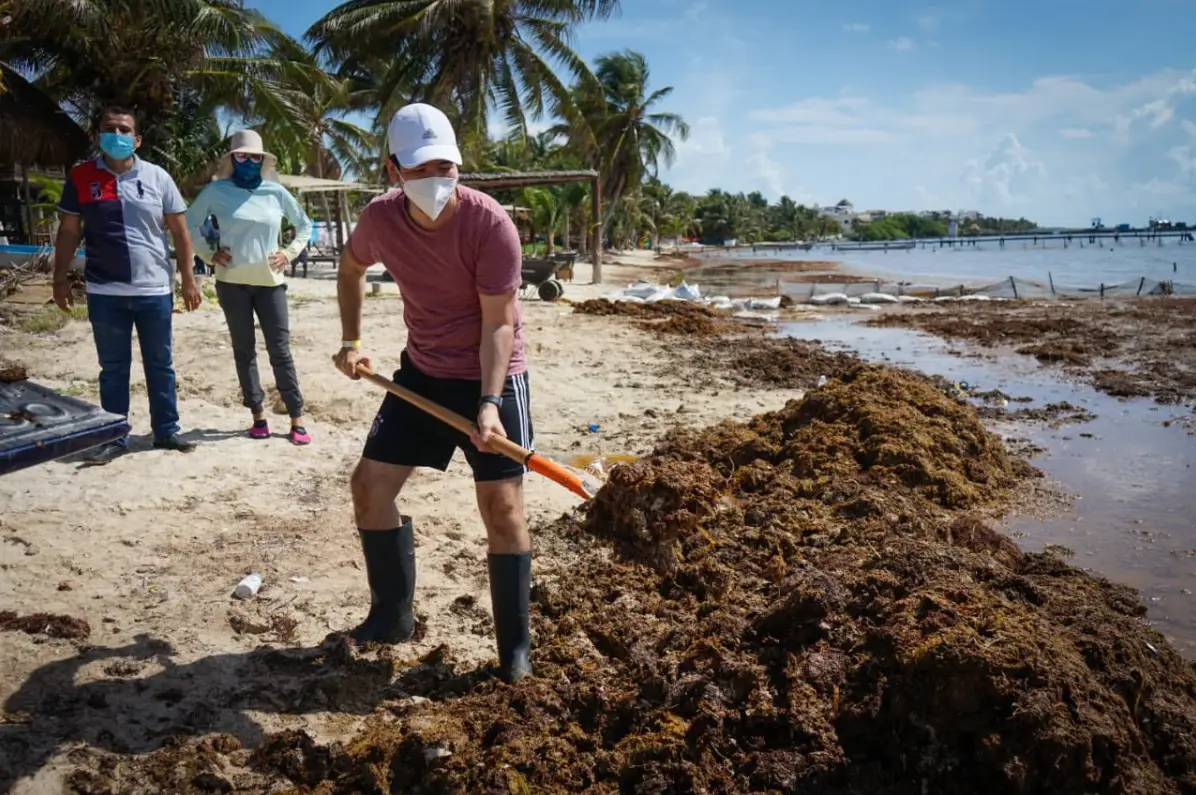In recent years, vast blooms of sargassum seaweed have become an increasingly disruptive force across the Greater Caribbean. Once a symbol of marine biodiversity in the open ocean, this macroalgae now blankets beaches from Barbados to Mexico, threatening tourism, livelihoods, ecosystems, and critically, public health.
As climate change warms the oceans and shifts nutrient flows from rivers like the Amazon, sargassum thrives. But when it washes ashore and begins to decompose, it emits toxic gases, most notably hydrogen sulfide and ammonia, posing growing risks to human health, in addition to the enormous impact it has on tourism in the region.
In recent years, communities across the region report spikes in respiratory illness, especially among vulnerable groups like the elderly, children, and those with asthma or chronic obstructive pulmonary disease (COPD). In Martinique and Guadeloupe, studies have linked chronic exposure to sargassum emissions with headaches, nausea, eye irritation, and even pregnancy complications such as preeclampsia and gestational hypertension. The burden falls disproportionately on coastal communities who often lack access to adequate health services and depend on the sea for income.
Despite the scale and severity of the issue, sargassum-related health impacts remain a neglected topic in the global climate and health agenda. Most climate-health discussions focus on heat stress, vector-borne diseases, or food insecurity, yet the toxicological and environmental health implications of sargassum are largely under-researched.
Still, the story of sargassum is not just about an emerging hazard, it’s also about opportunity. Rather than waiting for sargassum to rot on shorelines and poison the air, several Caribbean states are exploring sustainable pre-collection and processing techniques. When harvested before decay, sargassum can be transformed into high-value products: bioplastics, fertilizers, animal feed, cosmetics, and even biofuels. Companies in the Dominican Republic, Mexico, and Barbados are already piloting such innovations. Early harvesting also helps preserve the seaweed’s bioactive compounds, which show potential for use in natural pharmaceuticals and functional ingredients, opening new doors for health innovation and drug discovery.
This approach aligns squarely with the vision of a fair blue economy: one that leverages marine resources without compromising the ecosystems and communities that depend on them. If approached thoughtfully, sargassum harvesting could boost coastal employment, support local entrepreneurship, and introduce new industries in biotechnology and green manufacturing.
We have the chance to build environmental literacy and climate resilience across the region. School programs, training centers, and public education campaigns can use the sargassum issue to teach about marine biodiversity, the impacts of warming seas, and the urgent need for regional cooperation. Just as importantly, it can help people begin to draw deeper connections between climate and human health, a relationship that is too often overlooked. When individuals see how rising ocean temperatures and ecological disruption can translate into respiratory illness, pregnancy complications, and mental distress, climate change becomes a personal, tangible issue. By fostering this awareness, the Caribbean can help lead a shift toward more integrated climate and health policy solutions.
The Association of Caribbean States (ACS) is playing a pivotal role in advancing regional cooperation in sargassum management efforts through its SARGCOOP II programme, which promotes shared monitoring and sustainable reuse strategies. While health integration has largely been absent from these efforts, the ACS has begun to address this gap by supporting discussions on implementing a Caribbean Air Quality Monitoring Network to confront the associated health impacts. The recent coordination meetings in Guadeloupe could serve as a platform for expanding this multi-sectoral approach to include health ministries and public health experts. In a virtual address, the Secretary General of the ACS, Noemí Espinoza Madrid, emphasized the urgent need for regional cooperation on sargassum and reaffirmed the organization’s commitment to cross-border collaboration.
Addressing the sargassum crisis requires a transdisciplinary approach, bringing together oceanographers, climate scientists, public health experts, economists, doctors, tourism stakeholders, community leaders, policy makers and innovators to co-develop integrated solutions that protect ecosystems, reduce health risks, sustain local economies, and preserve the Caribbean’s vital tourism industry. The Greater Caribbean is uniquely positioned to lead on this front. It has faced the worst of the sargassum crisis and now holds the tools to turn the tide, if we prioritize health, equity, and ecological sustainability.
Let us imagine a future where the very seaweed that once choked our coastlines becomes a symbol of innovation and renewal. To get there, we must act together, guided by transdisciplinary science, solidarity, and a deep commitment to the well-being of our people and oceans.













